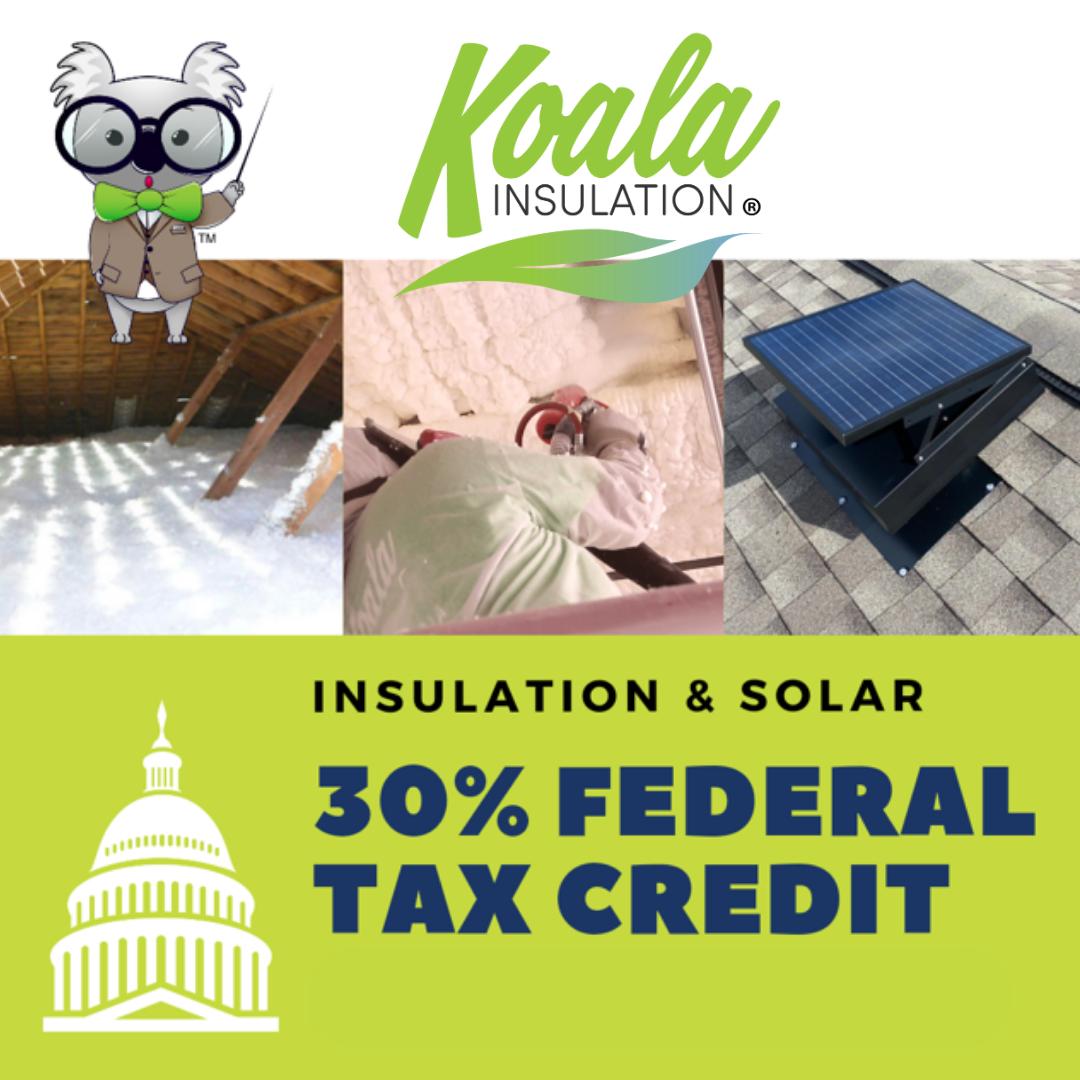
Inflation Reduction Act Tax Credits for Insulation | Koala Insulation
If you’re planning a few home improvements that will boost the energy efficiency of your house, you may save some money on your projects under the Inflation Reduction Act (IRA). The Inflation Reduction Act (IRA), signed by President on August 16, 2022, provides billions of dollars to supplement federal energy efficiency incentives through tax credits and deductions, as well as several rebate, grant and loan programs.
Some programs, such as tax credits and deductions, take effect immediately, while other programs provide funding to federal agencies allocated to states to create these programs managed through state, county, and municipal governments.
Building energy efficiency incentives addressed by the IRA are categorized as follows:
- Existing Residential Buildings & Residential Clean Energy Credit Tax credits and rebates available to homeowners performing energy efficiency upgrades
- New Residential Buildings Tax incentives for builders and developers of new energy efficient homes.
- New and Existing Commercial Buildings Tax incentives for builders and building owners of commercial buildings
- Energy Code Adoption and Workforce Training
For this blog, I’m going to focus on the Residential Efficiency Tax Credit (25C) for existing residential buildings and the Residential Clean Energy Credit.
Residential Efficiency Tax Credit (25C)
Initially created under the Energy Policy Act of 2005 (EPAct) and added to the federal tax code under Section 25C the program has been expanded and extended under the IRA (Section 13301). First, the new 25C program retroactively extends the 2021 program through December 31, 2022. More important are the changes beginning January 1, 2023. For improvements completed in 2023, the new terms of 25C allow a 30% tax credit, up to an ANNUAL maximum of $1,200. The annual maximum allows you to make improvements to your house each year and get 30% back. This is a significant increase over the 10% credit with a $500 lifetime maximum.
The new program incentivizes homeowners to perform a full range of qualifying energy improvements over multiple years.
Residential Clean Energy Credit (25D)
The second credit for homeowners is the current Residential Energy Efficient Property Credit, which also gets a new name under the Inflation Reduction Act. It's now called the Residential Clean Energy Credit. The credit, which was previously scheduled to expire in 2024, is extended through 2034 as well.
In addition to a name change and extension, the Inflation Reduction Act also boosts the credit amount. Previously, the credit was worth 26% of the cost to install qualifying systems that use solar, wind, geothermal, biomass or fuel cell power to produce electricity, heat water or regulate the temperature in your home. The credit amount was also scheduled to drop to 23% in 2023 and then expire in 2024.
Under the Inflation Reduction Act, the credit amount jumps to 30% from 2022 to 2032. It also does NOT have a cap. The credit will then expire after 2034.
For more information click on the link below to find an IRS Fact Sheet & Energy Star tax legislation:
https://www.irs.gov/pub/taxpros/fs-2022-40.pdf
https://www.energystar.gov/about/federal_tax_credits/tax_credit_legislation
What's the difference between a tax credit and a tax deduction?
A tax deduction reduces the amount of income subject to tax. For example, if your taxable income is $25,000 and you have a $500 tax deduction, your taxable income would be reduced to $24,500.
A tax credit reduces the amount of tax you have to pay. For example, if you owe $800 in taxes at the end of the year, and you get a $300 tax credit, then you will only owe $500. If you are getting a refund at the end of the year, you can still most likely collect the entire tax credit, as long as the total amount of income taxes that you have paid throughout the year (check your W2 for this amount) is more than the total amount of tax credits that you are claiming. You generally can't get more money back from the government than you paid in income taxes with the exception being "refundable" tax credits, such as the Earned Income Tax Credit.
If you don't pay any taxes, then you can't get the tax credit for energy efficiency.
Please give us a call or book your free estimate online to today. We strive to stay up-to-date on the latest credits and rebates, including rebates from your power company to ensure we maximize your return on investment.
Ready to book your free insulation evaluation?
We have 3 convienant ways for you to get in touch
We Provide Insulation Services to the Following Central Atlanta Areas
Kirkwood, Candler Park, Druid Hills, Morningside, Decatur, Scottdale, Clarkston, Downtown, Duluth, Norcross, Doraville, Chamblee, Lawrenceville, Lilburn, Tucker
Counties Served
Gwinnett County, Dekalb County, Fulton County
Zip Code
30303, 30305, 30308, 30309, 30313, 30314, 30318, 30324, 30332, 30334, 30361, 30363, 30369, 30021, 30030, 30033, 30079, 30306, 30307, 30317, 30322, 30329, 30345, 30044, 30047, 30084, 30071, 30093, 30096, 30340, 30341
